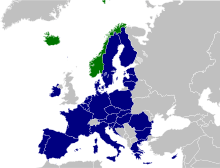European Union international calls regulations
Regulation 2018/1971 sets the maximum price caps for intra-EU international communications made from subscribers' home network countries. Regulation is in force since 15 May 2019.
| European Union regulation | |
| Text with EEA relevance | |
 | |
| Title | Regulation (EU) 2018/1971 of the European Parliament and of the Council of 11 December 2018 establishing the Body of European Regulators for Electronic Communications (BEREC) and the Agency for Support for BEREC (BEREC Office), amending Regulation (EU) 2015/2120 and repealing Regulation (EC) No 1211/2009[1] |
|---|---|
| Made by | European Parliament & Council |
| Journal reference | |
| Other legislation | |
| Amends | 2015/2120 |
| Current legislation | |
Territorial extent

Countries where regulation applies (both in blue and green)
Regulation applies to 30 EEA member countries (27 EU member countries as well as 3 EFTA member countries - Iceland, Liechtenstein and Norway), as well as the United Kingdom while it is in the so called transition period after it withdrew from the EU on 31 January 2020.
Prices
| In force from | 15 May 2019 | |
|---|---|---|
| In force until | 14 May 2024 | |
| Service | Unit | Price cap (in EUR, excl. VAT) |
| Retail caps (apply to subscribers) | ||
| Outgoing international calls made from the home network to any EEA number | price of 1 minute | 0.19 |
| billing interval | Not regulated | |
| Outgoing text message to any EEA number | price of 1 message | 0.06 |
gollark: Perhaps it cryoapioformed your user creation somehow.
gollark: You can also do "chsh" to change your shell preference.
gollark: Type "bash" to enter the "bash" shell.
gollark: That is due to the "dash" shell.
gollark: Try logging in on a text terminal (ctrl+alt+F1) instead.
References
- "EUR-Lex - 32018R1971 - EN - EUR-Lex". eur-lex.europa.eu.
This article is issued from Wikipedia. The text is licensed under Creative Commons - Attribution - Sharealike. Additional terms may apply for the media files.